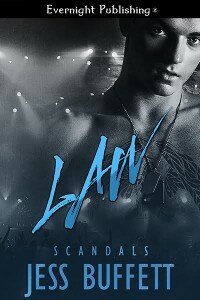 Title:
Title:
Author: M. Jules Aedin
Publisher:
Genre: M/M Historical Fantasy Romance
Length: Novel
Rating: 4.25 stars out of 5
A guest review by Jenre
THE BLURB
Raised in a strict religion that forbids association with foreigners as well as love between men, Arieh Sef’ea cannot imagine a worse fate than to be sold as a love-slave to a Keshen soldier. Both men must learn that bodies may be purchased, but hearts must be won.
THE REVIEW
I’ve read a number of short stories by M. Jules Aedin. Her writing has always impressed me, especially as she is relatively young and I was interested in seeing whether she could sustain that level of quality through a novel length piece. On the whole I wasn’t disappointed, although Every Good Thing suffered slightly from being the first book in a series.
Every Good Thing is part historical, part fantasy set in a pseudo-Middle Eastern country similar to that of Israel/Palestine. The country is a seething mass of different cultures all living together and under the rule of the Keshen people, who are similar to the Romans. Arieh is a Riinean boy, sold into slavery to by his family to pay for their taxes. The Riineans are a race of people very similar to the Jews (although they are not monotheistic), who look down on foreigners and claim that anyone who is not Riinean is faithless and unclean, and who have a long list of rules about which foods they can eat (ie. not pork) and how they are to live their lives. Arieh is taken to the slave market where he is bought by a Kentari soldier, Enitan, to be his pais, which is like a sex slave but offers much greater opportunities for love and companionship. The story follows Arieh as he comes to terms with his new position in Enitan’s house and tries to set aside the strict teachings on homosexuality from his upbringing. Alongside this plot are several subplots involving jealous slaves, the relationship between Enitan and Junia, a female slave in his house and also rumblings of discontent about the appearance of a strange Riinean man who appears to be able to heal people by magic.
There’s a lot going on in this book and this is reflected in the number of viewpoints we get throughout the book. Not only do we get the thoughts of Arieh, Enitan and Junia but also Enitan’s personal slave, Demis; a dancing girl called Sariyah; Kallias the cook; Kayin, Enitan’s second in command; and Suqua the apprentice to the healer, Ashar. In some ways this was a good thing as all these voices provided a rich tapestry which added to the world building but I did feel a couple of times that some of the scenes, especially between Suqua/Ashar, and Sariyah/Junia, were rather superfluous to the plot and this affected some of the pacing. I began to be a little impatient during those scenes and wanted to get back to the main plot. I also felt that the subplot between these two pairs, could probably have been edited down slightly and that would have reduced some of the problems I felt with the slow pacing. Having said that, Every Good Thing is the first of a series so maybe it was necessary to have all these characters and see the beginnings of their stories start to develop, we shall see when the next book is released.
Where this book really shone was in the creation of the world in which these characters lived. The descriptions of daily lives, of religion, of the city in which they lived was vivid and beautifully realised. I really felt like I was living and breathing in this world with its smells, heat and dust of the city which then contrasted with the cool, clean opulence of Enitan’s house. The world is part Arabian Nights with its dancing girls, slaves and shady dealings; and part biblical with the Riinean people and the displeasure of their god. The streets throng with people from every nation and the sights, sounds and smells of all those people are captured within this book.
Several of his men paced around the edges of the crowd or stalked through it on his orders, shoving bidders aside when there was no path between the tightly packed bodies. Enitan could smell the stink of the crowd, the pungent odor of unwashed bodies like soured spices, and the sickly sweet oils and perfumes that were poured over the slaves and rubbed into their skin. Dust clung to the air as he breathed it in. Dust and sweat and heat; it all collected in his lungs and made him wish more than anything that he were home in his cool marble bath, a servant pouring clear, sweet water over his hot, tired, dirty feet.
The characters are also well drawn and believable. Enitan is a mix of strong and gentle in his dealings with Arieh. Arieh’s confusion and growth in terms of accepting his fate and then slowly falling in love was a delightful journey. I liked Junia, who came across as both strong and compassionate. There wasn’t one character who slipped into caricature so those of you who like strong character based novels will not be disappointed with Every Good Thing.
One interesting part of the book related to Ashar the healer. The author uses many ideas lifted from the bible and links them to the Riineans but especially she takes incidents from Jesus’ life in the New Testament and applies them to the Riinean ‘magician’, Ashar. These included Zaccheaus in the tree, the stoning of the prostitute, Peter’s confession of the Christ and the healing of the Centurian’s daughter. The character of Ashar is very sympathetic and is used to show that the Riinean people are not all judgemental and backward-looking, but I did feel cautious about how the author may develop this subplot, especially in the relationship with the healer and his apprentice. I’m not a great fan of books which take organised religion and subvert it for their own ends but I shall reserve judgement about this subplot until after I read the next in the series.
One aspect of this book which made me feel slightly uncomfortable was the problem of Arieh’s age. The book is set around the time of the Romans/Jesus and, although the setting is fictional, many of the customs of that time are used in this book. It was common at that time for teenagers to be married to one another and have children. Arieh’s age is never specifically mentioned, but I gathered from the descriptions of his ‘coming of age’ ceremony and also the way he is described as being on the cusp of manhood that he must likely be no older than 16, perhaps younger. I know that this is in keeping with the setting but it still made me a little uncomfortable, especially as Enitan calls him ‘boy’ for most of the story.
Overall this was a complex, involving read. M. Jules Aedin has proven that she can sustain that quality of writing over a novel in the way she has created and established the setting in this novel and produced some original characterisations. So despite a few reservations, I do feel that Every Good Thing is worth reading and I would recommend it. I have another novel by this author in my TBR pile and intend to pull it out and read it sooner rather than later, and I also look forward to the second book in this interesting series.














Hi Jules
Thanks for stopping by and giving some insider information :).
*
I’ll definitely be checking out your interview.
I really liked her short stories so will definitely keep an eye out for this one even if historicals aren’t really my thing, but with a touch of fantasy thrown in it will likely work better for me. Great review.
Thanks, Tam
Jules told me on Twitter that the book is supposed to be fantasy rather than an historical, so don’t let the historical label (which is mine, to be honest, cos I wasn’t sure how to describe it) put you off. It is set in a world/country/time similar to that of the Roman occupation of the Middle East, but the places are purely fictional.
This was my first novel by her as well after reading a few short in anthologies. I really liked this one. I did not see all the biblical references though, still, I like the setting of the story and the way it developed.
When the next book comes out I will surely buy it.
Hi Ingrid
I don’t think you would be alone in not getting some of the biblical references. The parts taken from the NT are not necessarily those which would be taught to children in schools (apart maybe from Zacchaeus in the tree) and so unless you know the NT well then it’s unlikely you’d pick up on it.
I’m also looking forward to the next book in the series as there were a number of plot threads left hanging and I’d be interested to see how they are tied up.